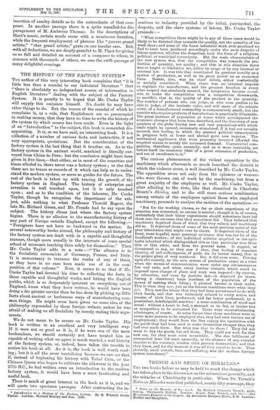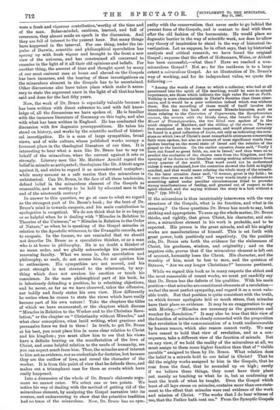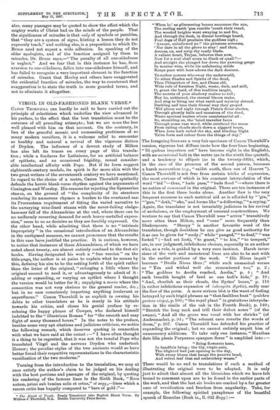TRENCH AND BRUCE ON MIRACLES.*
Tut two books before us may be held to mark the change which has taken place in the discussion on the miraculous generally, and the miracles of Christianity in particular. When Dr. Trench's Notes on Miracles were first published, nearly fifty years ago, they • Notes on the Miracles of Our Lord. By Richard Chenevix Trench, Arch. bishop. Thirteenth Edition. London: Regan Paul, Trench, and Co.—The Minicab= Element in the Gospels. By Alexander Babnain Bruce, D.D. London Hodder and Stoughton,
were a fresh and vigorous contribution:worthy of the time and of the man. Sober-minded, cautions, learned, and fall of reverence, they almost made an epoch in the discussion. And they are full of interest to the present hour. But many things have happened in the interval. For one thing, under the im- pulse of Darwin, scientific and philosophical speculation has sprung np with fresh vigour and brought to the front a new view of the universe, and has constrained all concerned to examine in the light of it all their old opinions and beliefs. For another thing, the amount of time and thought spent by many of our most eminent men at home and abroad on the Gospels has been immense, and the bearing of these investigations on the miraculous element in the Gospels has to be ascertained. Other discussions also have taken place which make it neces- sary to state the argument anew in the light of all that baa been said and done for the last fifty years.
Now, the work of Dr. Brace is especially valuable because it has been written with direct reference to, and with fall know- ledge of, all the discussions we have spoken of. He is familiar with the immense literature of Germany on this topic, and also with what has been written in England. He has conducted the discussion with few dogmatic presuppositions. He takes his stand on history, and works by the scientific method of histori- cal investigation. He is a man of large sympathies, broad views, and of wide culture, whose published works occupy a foremost place in the theological literature of our time. It is interesting to hear what a man like Dr. Brace has to say on behalf of the miraculous, when the current against it sets so strongly. Literary men like Mr. Matthew Arnold regard the belief in miracle as antiquated; theologians like Dr. Abbott argue against it, and strive to regard it as misunderstood metaphor; while many assume as a safe maxim that the miraculous is unhistorical. Can Dr. Bruce, in the face of all these tendencies, defend belief in the miraculous element of the Gospels as reasonable, and as worthy to be held by educated men in the end of the nineteenth century?
In answer to this question, we go at once to what we regard as the strongest part of Dr. Bruce's book ; for the bent of Dr. Bruce's mind is towards exegesis, and his main contribution to apologetics is exegetical. We do not think that he is so happy or so helpful when he is dealing with "Miracles in Relation to Theories of the Universe," or " Miracles in Relation to the Order of Nature," as when he is speaking of the Gospel miracles in relation to the Apostolic witnesses, to the Evangelic records, and to exegesis. In the former, we are reminded that we should not describe Dr. Bruce as a speculative thinker, or as a man who is at home in philosophy. He is no doubt a thinker of no mean order, and we gladly acknowledge his pre-eminent reasoning faculty. What we mean is, that speculation and philosophy, as such, do not arouse him, do not quicken him to enthusiasm. His sympathies are not moved, and his great strength is not strained to the uttermost, by any- thing which does not awaken his emotion or touch his conscience. In the more philosophical part of his book, he is laboriously defending a position, he is rebutting objections, and he never, as far as we have observed, takes the offensive, nor boldly and freely states his own view. How differently he writes when he comes to state the views which have really become part of his own nature ! Take the chapters the titles of which we have enumerated, or the chapters which discuss " Miracles in Relation to the Worker and to the Christian Reve- lation," or the chapter on " Christianity without Miracles," and what clear conceptions, what lucid writing, what gracious and persuasive force we find in them ! In truth, to get Dr. Bruce at his beet, you must place him in some clear relation to Christ and his kingdom ; you must allow him to see that his views have a definite bearing on the manifestation of the love of Christ, and some helpful relation to the needs of humanity, ere you can expect much from him. Thus, the miracles are of interest to him not as evidence, nor as credentials for doctrine, but because they are the outflow of love, and reveal the character of the worker. It is from this point of view that he defends them, and makes out a triumphant case for them as events which have really happened.
Into a discussion of the whole of Dr. Bruce's elaborate argu- ment we cannot enter. We select one or two points. We notice his way of dealing with the method of getting rid of the miraculous element, by analysing the Gospel narrative into its sources, and endeavouring to show that the primitive tradition had no trace of the miraculous. Now, Dr. Bruce has no sym-
pathy with the conservatism that never seeks to go behind the present form of the Gospels, and is content to deal with them after the old fashion of the harmonists. He would place no dogmatic barrier in the way of scientific work, nor does he allow any theory of inspiration to stand in the way of historical in- vestigation. Let us suppose, he in effect says, that by historical analysis and critical research, we have found the original Gospel ; suppose that the effort of Holtzmann, Weiss, or Abbott has been successful,—what then P Have we reached a non- miraculous Gospel P Not so ; for the residuum is to a large extent a miraculous GospeL As an illustration of Dr. Brace's way of working, and for its independent value, we quote the following ;—
" Among the words of Jesus to which a collector, who had at all penetrated into the spirit of His teaching, would be sure to attach importance, are those which indicate the high value He set on Faith. Nothing is more characteristic in Christ's doctrine than these utter- ances, and it would be a poor collection indeed which was without them. But the recording of these would of itself involve the introduction into the book of several Miracle-histories, such as those relating to the Centurion of Capernaum, the Syrophonician woman, the woman with the bloody issue, the lunatic boy at the Mount of Transfiguration, the two blind men spoken of in the ninth chapter of Matthew, and the stilling of the storm. The two first mentioned are the most important, and would almost certainly be found in a good collection of Logia, not only as indicating the coca- sions on which two of Christ's most remarkable utterances concerning faith were spoken, but also on account of moat significant words then spoken bearing on the moral state of Israel and the relation of the gospel to the heathen. On the earlier occasion Jeans said, ' Verily I have not found so great faith, no, not in Israel,' and then went on to predict the exclusion of the chosen race from the Kingdom, and the opening of its doors to the Gentiles coming seeking admittance from every quarter of the world. That word could not be understood unless it were explained, how the centurion showed the faith so highly extolled, and that would mean relating the whole story of the miracle. On the later occasion Jesus said, ' 0 woman, great is thy faith ; be it unto thee even as thou wilt.' The very words imply a reference to something asked under peculiar circumstances titled to provoke strong manifestations of feeling, and granted out of respect to the spirit elicited, and the saying without the story is a lock without a key." (pp. 10I-5.)
If the miraculous is thus inextricably interwoven with the very structure of the Gospels, what is its function, and what is its meaning ? On these questions Dr. Bruce has much to say, both striking and appropriate. To sum np the whole matter, Dr. Bruce thinks, and rightly, that given Christ, his character, and mis- sion, a miraculous element in his work is probable, and to be expected. His person is the great miracle, and all his mighty works are manifestations of himself. This is set forth with great power, both positively and negatively. On the positive aide, Dr. Bruce sets forth the evidence for the sinlessness of Christ, his goodness, wisdom, and originality ; and on the negative aide, proves that if the miraculous element is left out of account, humanity loses the Christ. His character, and the worship of him, must be lost to men, and the question of Strauss, " Are we any longer Christians P" becomes pertinent.
While we regard this book as in many respects the ablest and the most reasonable of recent works, we must yet candidly say that Dr. Bruce has the defects of his qualities. With his main position—that miracles are constituent elements of a revelation— we feel the most perfect sympathy, and regard it as a most valu- able truth. But that position is quite consistent with the truth, on which former apologists laid so much stress, that miracles have their place as evidence. It may be an exaggeration to say with Mozley,—" Miracles are necessary as the guarantee and voucher for Revelation." It may also be true that this view of the function of miracles is closely connected with the proposition that revelation is the communication of a troth undiscoverable by human reason, which also reason cannot verify. We may have ceased to hold that view of revelation, and as a con- sequence, take a different view of the function of miracle. But on any view, if we hold the reality of the miraculous at all, we mast assign to them some higher function than that of " visible parable" assigned to them by Dr. Bruce. What relation does the belief in a miracle hold to our belief in Christ P That he did the mighty works assigned to him in the Gospels, that he rose from the dead, that he ascended up on high ; surely if we believe these things, they must have their place not merely as teaching us what he is, but as confirming at least the troth of what he taught. Even the Gospel which least of all lays stress on miracles, contains more than one state- ment to the effect that miracles were real evidence of the work and mission of Christ. " The works that I do bear witness of me, that the Father bath sent me," From the Synoptic Gospels also, many passages may be quoted to show the effect which the mighty works of Christ had on the minds of the people. That the significance of miracles is that only of symbols or parables, that "they are a system of signs, hinting a lesson they do not expressly teach," and nothing else, is a proposition to which Dr. Bruce need not expect a wide adhesion. In speaking of the older apologists, and of the function assigned by them to miracles, Dr. Bruce says,—" The penalty of all one-sidedness is neglect." And we fear that in this instance he has, from aversion to one-sidedness, fallen into one-sidedness himself, and has failed to recognise a very important element in the function of miracles. Grant that Mozley and others have exaggerated the evidential function of miracles, the way to counteract that exaggeration is to state the truth in more guarded terms, and not to eliminate it altogether.




















































 Previous page
Previous page